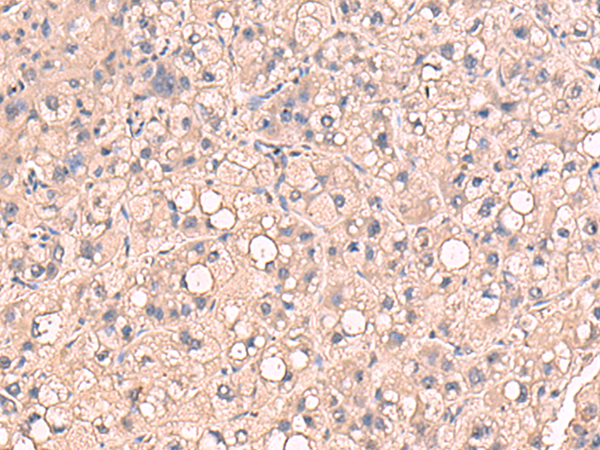
| WB | 咨询技术 | Human,Mouse,Rat |
| IF | 咨询技术 | Human,Mouse,Rat |
| IHC | 1/70-1/350 | Human,Mouse,Rat |
| ICC | 技术咨询 | Human,Mouse,Rat |
| FCM | 咨询技术 | Human,Mouse,Rat |
| Elisa | 1/5000-1/10000 | Human,Mouse,Rat |
| Aliases | RIO1; AD034; RRP10; bA288G3.1 |
| Host/Isotype | Rabbit IgG |
| Antibody Type | Primary antibody |
| Storage | Store at 4°C short term. Aliquot and store at -20°C long term. Avoid freeze/thaw cycles. |
| Species Reactivity | Human, Mouse |
| Immunogen | Fusion protein of human RIOK1 |
| Formulation | Purified antibody in PBS with 0.05% sodium azide and 50% glycerol. |
+ +
以下是3篇关于RIOK1抗体的参考文献及其摘要内容概括:
1. **文献名称**:*"RIOK1 promotes colorectal cancer cell proliferation and metastasis via Akt signaling pathway"*
**作者**:Li X, Zhang Y, et al.
**摘要**:该研究利用RIOK1特异性抗体检测结直肠癌组织中RIOK1蛋白表达水平,发现其高表达与患者预后不良相关。实验证实RIOK1通过激活Akt信号通路促进癌细胞增殖和转移。
2. **文献名称**:*"RIOK1 is a synthetic lethal target in MYC-driven cancers"*
**作者**:Huang H, Wang Y, et al.
**摘要**:通过免疫沉淀(IP)和Western blot分析,研究发现RIOK1抗体可特异性识别并抑制MYC高表达肿瘤细胞中的RIOK1功能,揭示RIOK1作为MYC依赖性癌症的潜在治疗靶点。
3. **文献名称**:*"RIOK1 overexpression contributes to tumor progression in non-small cell lung cancer"*
**作者**:Chen L, Liu J, et al.
**摘要**:利用RIOK1抗体进行免疫组化分析,发现非小细胞肺癌组织中RIOK1过表达与肿瘤分期和转移显著相关。机制研究表明,RIOK1通过调控细胞周期蛋白加速肿瘤进展。
以上文献均通过RIOK1抗体进行蛋白定位或功能研究,揭示了其在癌症中的生物学作用及临床意义。
The RIOK1 antibody is a research tool designed to detect and study the RIO kinase 1 (RIOK1) protein, a member of the atypical kinase family involved in critical cellular processes. RIOK1. part of the evolutionarily conserved RIO kinase family (RIOK1. RIOK2. RIOK3), lacks canonical kinase activity but plays essential roles in ribosome biogenesis, cell cycle progression, and genome stability. It localizes predominantly in the cytoplasm and nucleolus, participating in 18S rRNA processing during ribosomal subunit maturation. Dysregulation of RIOK1 has been implicated in cancer, with overexpression observed in hepatocellular carcinoma, breast cancer, and glioblastoma, correlating with poor prognosis and tumor progression. Its interaction with pathways like mTOR and KRAS underscores its potential role in oncogenic signaling.
RIOK1 antibodies enable researchers to investigate protein expression, subcellular localization, and functional interactions through techniques like Western blotting, immunofluorescence, and immunoprecipitation. Recent studies highlight RIOK1's non-catalytic scaffolding functions in stress response and apoptosis regulation. The development of specific RIOK1 antibodies has advanced understanding of its structural features, including its unique kinase-like domain and ATP-binding motifs. These tools are crucial for exploring RIOK1's therapeutic potential as a biomarker or target in precision oncology, particularly in cancers driven by ribosomal dysfunction or aberrant cell cycle control.
×